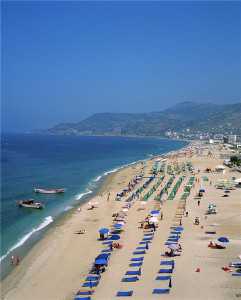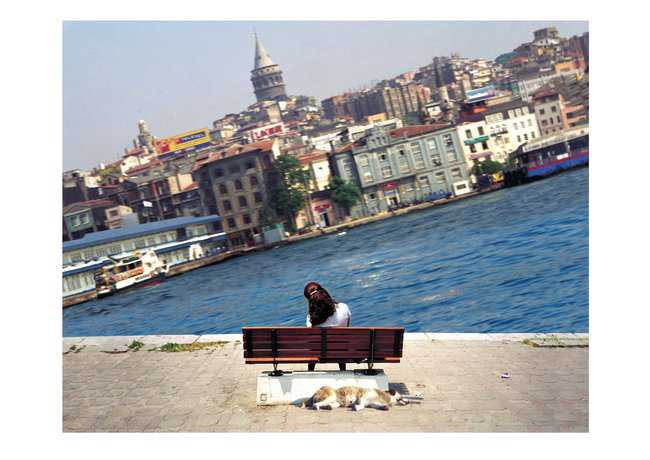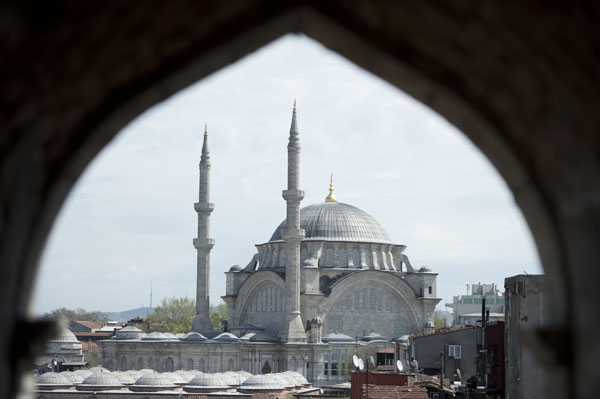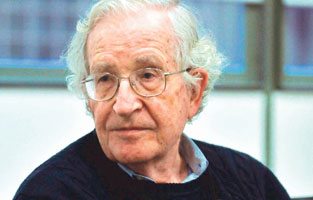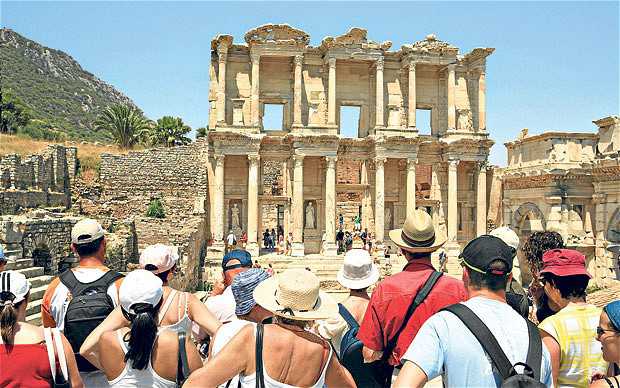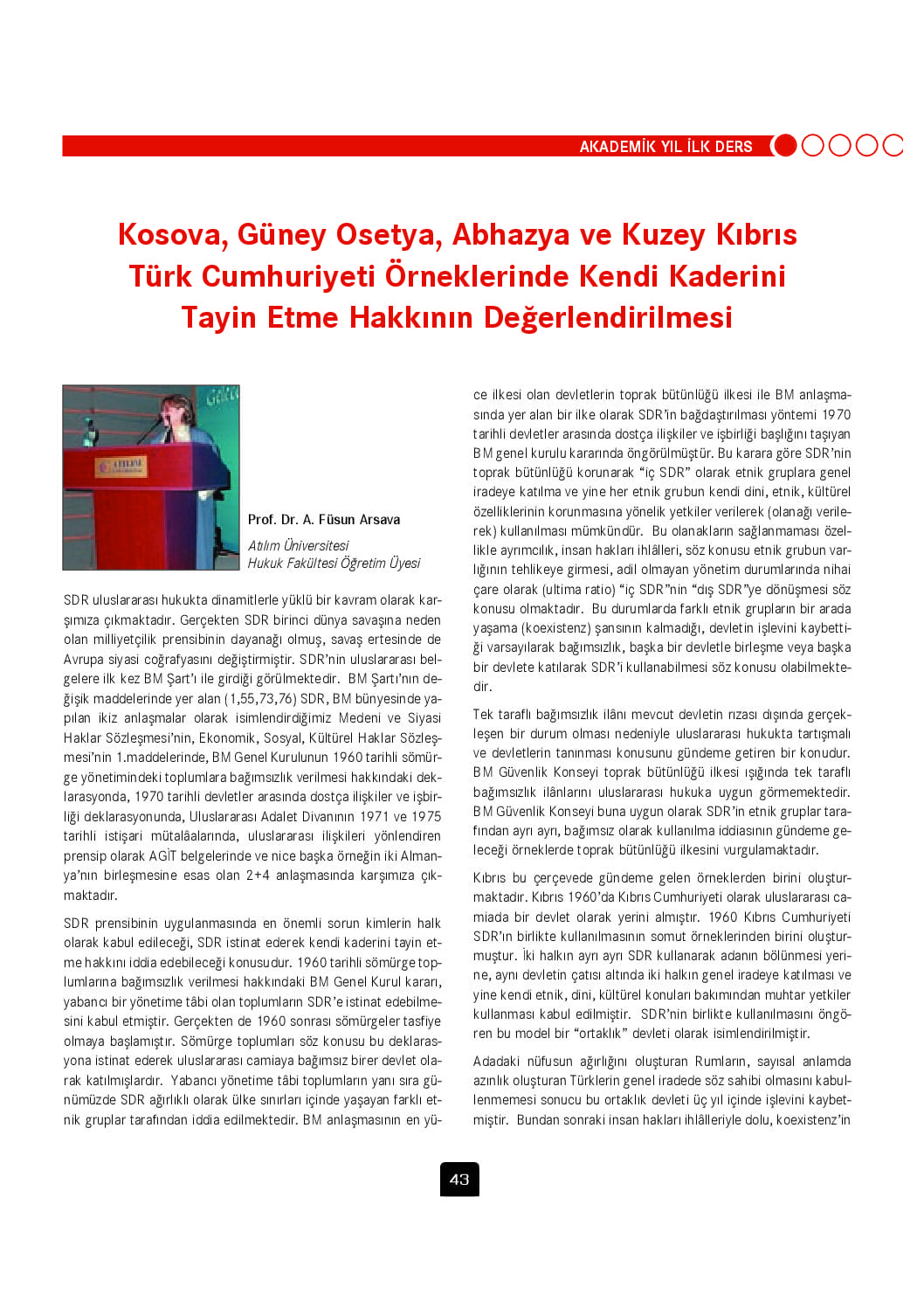The Kosovo Syndrome and the Search for a Settlement in Cyprus
by Sema Sezer
From the early 1990’s to today, we have seen the formation of 9 new independent states in the south and east of Europe emerge from the break up of Yugoslavia and Czechoslovakia alone. On 1 January 1993, Czechoslovakia was divided into the “Czech Republic” and “Slovakia” through what was termed as a “velvet separation” as a result of a joint decision taken by the Czech and Slovakian Parliaments. On 1 May 2004, the two new states joined the European Union (EU). Disintegration in the Socialist Federal Republic of Yugoslavia started in 1992 with the separation of four states – Croatia, Slovenia, Bosnia-Herzegovina and Macedonia. Finally, a total of seven independent states were born out of the former Yugoslavia with the separations of Montenegro from Serbia following a referendum on 21 May 2006, and then Kosovo, which was an autonomous region, after it declared its independence on 17 February 2008 from Serbia. Slovenia joined the EU with the 1 May 2004 enlargement process, while Croatia is in continued EU accession talks since October 2005, and Macedonia declared as a candidate country in December 2005. The winds of dissolution/separation were not limited to the east and south of Europe. In past years, debates on the issue of separation have arisen even in Belgium, despite its capital, Brussels, being central to the EU and the North Atlantic Treaty Organisation (NATO). Debates have increasingly intensified as to whether the separation of Montenegro in 2006 and Kosovo’s declaration of independence from Serbia could constitute an example for problematic regions in other parts of the world. Cyprus became the main focal point of these debates in Turkey.
The reasons for mentioning the above events is to point out that every new-born state has been recognised by the international community, especially the EU states, and have taken their place in the international system within a short period of time despite the methods, and political and legal aspects of separation and independence processes all being different as in the examples of Czechoslovakia and Yugoslavia.
Kosovo and Cyprus: Differences and Similarities
Essentially, the Kosovo and Cyprus cases are both politically and legally different. However, some parallels can be drawn on the grounds of human rights violations, which were experienced by Kosovar Albanians and which are still being experienced by Turkish Cypriots today, behavioural similarities between Serbians and Greek Cypriots and military interventions in both regions . Comparisons between these two nations can even be made based on both having lived under Ottoman rule for centuries. For instance, the majority of the 7.5 million population of Serbia is Serb and Orthodox. In Kosovo, the population of 2 million consists of 95% Muslim, 90% being Albanian. In Cyprus, approximately 260 thousand Turkish Cypriots live in the Turkish Republic of Northern Cyprus (TRNC), whereas 750 thousand Greek Cypriots live in the Greek Cypriot Administration of Southern Cyprus (GASC). The majority of Albanians and Turkish Cypriots are Muslim, whereas Serbs and Greek Cypriots are Orthodox Christian. A dominating sense of distrust between both the Serb and Albanian people in Serbia and Kosovo and the Turkish and Greek Cypriot population in Cyprus has led to a loss of will to live together.
The de facto situation in both Kosovo and Cyprus started with the destruction of the existing constitutional system by the Serb and Greek Cypriot majority respectively. In this process, both Albanians and Turkish Cypriots experienced ethnic cleansing, human rights violations and forceful migration. The Serb and Greek Cypriot attacks only stopped following military interventions. The United Nations peace force that was sent to the island in 1964 failed to make any significant impact in preventing Greek Cypriot attacks from 1963-1974. The bloodshed on the island eventually stopped through Turkey’s military intervention in 1974 by using its rights from the 1960 Guarantee Agreement. The existence of a Turkish military presence on the island is the biggest guarantee preventing a return to 1974. The military intervention in Kosovo came in 1999 from the Kosovo Force (KFOR), or in other words NATO forces.
Human rights violations and massacres orchestrated by the now deceased Serb leader Milosevic in Serbia and Papadopoulos in Cyprus, who was later to become the President of GASC during 2003-2008, presents another great similarity. The only difference being, while Milosevic was tried in front of the international community, Papadopoulos, who is known as the architect behind the ‘Akritas Plan’, the plan for the annihilation of Turkish Cypriots, was rewarded with Presidency. Furthermore, the disclosure of documents showing Papadopoulos as the person who was conducting money laundering for Milosevic in the GASC also shows another similarity between them.
In the south of Cyprus, the United Kingdom has two military bases (Akrotiri and Dhekelia), which were retained in accordance with the international agreements of 1960 and were not registered as EU territory; it is also used by the United States. In Kosovo, the US has the biggest military base in the Balkans and Europe – “Camp Bondsteel”.
After the military interventions of NATO in Kosovo and the Turkish Armed Forces (TAF) in Cyprus, Serbs and Greek Cypriots lost control of territories where Albanians and Cypriot Turks lived. However, according to the UN Security Council’s (UNSC) decisions, Kosovo continued to be considered as “Serbian territory” (Resolution 1244, 1999), and the Greek Cypriot Administration as the “Legitimate Government of the Republic of Cyprus” (Resolution 186, 1964).
Kosovo-Cyprus Precedent Debates and Double Standards of the International Community.
The different approaches taken by the international community to the Kosovo and Cyprus issues demonstrates the double standards applied from the beginning. The different approaches to the issues demonstrated by the proposed resolutions, the UN’s “Annan Plan” for Cyprus and the “Ahtisaari Plan” for Kosovo, are total opposites. While one of them encourages the “reunification” of the island, the other encourages “separation” of Kosovo from Serbia. This attitude still applies after the independence of Kosovo. Another example was when, within a short period following the declaration of independence by the TRNC, the UNSC decided to define this declaration as “null and void”, taking a decision that “calls for non-recognition” (15 November 1983/541, 13 May 1984/550). However, the same UNSC did not take any such decision against Kosovo’s declaration of independence.
The USA, the EU and NATO countries reached a consensus, with a few exceptions, on the recognition of the Republic of Kosovo, which declared its independence on 17 February 2008. While the USA was among the first states that recognised Kosovo, the EU declared that it has officially noted Kosovo’s independence on 18 February and left the decision of recognition to individual member states. Greece, GASC, Romania, Spain and Slovakia declared that they would not recognise the declaration of independence . The point of departure for these decisions is that independence can set a precedent for minorities in Romania, Slovakia and the Basque and Catalonia regions of Spain. The main concern of Greece and GASC is that this situation can pave the way for the recognition of TRNC’s independence. Moreover, Greece is concerned about Albanians and Macedonians. However, what almost all the states agree upon is that regardless of recognition, “Kosovo is not a precedent for Cyprus”.
The most striking comment in the precedent debate came from the former President of the Russian Federation Vladimir Putin, towards the end of his 8-year term, making an accusative statement of “the EU for its double standards in Kosovo and Cyprus” on 15 February 2008. Putin’s statement of “Northern Cyprus has been independent for 40 years. Why don’t you recognise it? Europeans aren’t you ashamed of your double standards?” is actually not in support nor an expression of the necessity for the recognition of TRNC’s independence. However, criticism of the double standards displayed by EU members echoed in many circles . Moreover, the statement is significant since this is the first time that the President of a permanent member of the UNSC has mentioned it. Essentially, expecting a change in policy towards Kosovo and Cyprus from Russia, which is known for its established support of Serbian and GASC policies, would not be realistic. Especially when one considers the role played by Russia in the crisis, which gave rise to a potential armed conflict, by selling an S-300 long-range SAM system to GASC and prevented a discussion of the UN Secretary-General’s Cyprus Report following the referendum of 24 April 2004 at the UNSC.
Consequently, what was the main aim of Putin’s statement? The following part of the statement has the answer. While Putin stated that they support a unified state in Cyprus and that the recognition of Kosovo is immoral and illegal, he also declared that Kosovo is not different from Abkhazia and South Ossetia, whereby they were forced to change their policies in these regions. Consequently, Putin might be signalling to Europe via the case of the TRNC that four frozen conflict zones can be separated – Abkhazia and South Ossetia from Georgia, Trans-Dniester from Moldova, Nagorno-Karabakh from Azerbaijan – and that their declaration of independence can be recognised. However, while evaluating Putin’s statement, the possibility of Kosovo setting a precedent for the federal republics and provinces in the Russian Federation like Chechnya, Tatarstan, Sakha (Yakutia) and Kaliningrad should not be overlooked.
At first glance, Kosovo cannot be taken as a precedent for the TRNC neither in terms of its declaration of independence nor the model applied following the declaration of independence. This is because the TRNC already declared its independence on 15 November 1983, 25 years before Kosovo. Although the TRNC is not recognised, except by Turkey, it has all the necessary institutions for a functioning state, and has a more improved sense of democracy than most Western states. Moreover, although many states recognised Kosovo, is it truly independent? Are we going to experience a new model for independence, independent from Serbia but dependent on the international community?
Consequently, the issue of Kosovo being a precedent for others can only be examined to criticise the international community’s attitude based on the existence of contradictory policies. Because, as mentioned by Putin, the international community is constantly making efforts to unite Cyprus, which has been divided for 40 years, but supported the separation of 7 states from Yugoslavia, Kosovo being the latest example.
Turkey’s guarantor status and the presence of TAF on the island seem to be the main influence behind the different international approaches to Kosovo and Cyprus. But when you examine this closely, the absence of a system like the Guarantee and Alliance Agreement of Cyprus and the continuation of KFOR for the security of Kosovo, allows the EU, UN and NATO to maintain greater influence over Kosovo. But in reality, according to article 3 of the 1960 Guarantee Agreement, in the case of a breach of any article of the Agreement, the guarantor countries, multilaterally, unilaterally or in cooperation, have the right to re-establish the state of affairs described by the Agreement. Turkey, whose Armed Forces are the second largest army in NATO as well as the most powerful and operationally capable in the region, intervened on the island based on its right to do so on 20 July 1974. In addition to this, provisional article 10 of the TRNC constitution grants its national defence and security to TAF. All of these factors not only provide a military deterrent but also a political one.
Reflections of Kosovo’s Independence to the Cyprus Issue
On 17 February 2008, while the first round of Presidency elections were held in GASC, Kosovo became the 49th state of Europe by declaring its independence. Kosovo’s independence has two effects on the Cyprus issue: the first and foremost being the rising discourse directed against Papadopoulos, initiated by the international community and his election rivals claiming that under his Presidency “the island will remain divided”. The EU and US kept this discourse on the agenda based on the idea that Papadopoulos’s rigid policies were restricting any area for movement and created an expectation that if Papadopoulos lost, then “a new period for resolution will start”. Putin’s accusing statement toward European states of “double standards regarding Kosovo and Cyprus” and Kosovo’s declaration of independence on the same day of the first round of elections reinforced Greek Cypriot voters’ fear of the international recognition of the TRNC and negatively affected votes for Papadopoulos. From this perspective, the international community had reached its aim after the first round of elections and was indifferent towards the remaining two candidates, Kasoulides and Christofias, in the second round. Both candidates based their campaign on “supporting a solution and negotiation with Turkish Cypriots”. Consequently, the uncompromising Greek Cypriot attitude in the referendum of 24 April 2004 was blamed on the losing party rather than the Greek Cypriot people. The electoral victory of Communist AKEL leader Christofias in the second round on 24 February enabled the restoration of GASC’s image in the international community as the side “who wants a solution”. Therefore, it was Papadopoulos himself that failed in the elections, not his policies.
The second effect is that rather than push for the international recognition of the TRNC, as was the case with Kosovo, efforts at unification for the island were intensified by the international community. In other words, Kosovo’s independence created an opposite effect in Cyprus. Following the Christofias – Talat meeting on 21 March 2008, study groups and technical committees were established for a three month period in preparation for comprehensive negotiations. The reports, which will be presented to the respective Presidents at the end of June, will determine the initiation of comprehensive negotiations.
When analysing the current political situation in Southern Cyprus, AKEL’s policies and the influence of the Greek Cypriot Orthodox Church, it appears very doubtful that the Christofias administration have enough will for a solution with possible negotiations. The most significant reason for this is that the Greek Cypriot National Council, which is composed of all the Greek Cypriot political party leaders, decides policies on the Cyprus issue. The signing of all Council decisions by the leader of AKEL, i.e. Christofias, during Papadopoulos’s presidency can be taken as a sign that the Greek Cypriot policy of 2003-2008 will continue. During Papadopoulos’ presidency an agreement had been reached where part of these negotiations were to continue with a coalition government model with policies towards the Cyprus issue and to never put the Annan Plan on the agenda. In fact, we can now see that after his election, Christofias seems to be sticking to this agreement.
Christofias talks about a two region – two nation federal solution. However, he employs a “unitary” state discourse with statements calling for “one state, one sovereignty and one citizenship”. He proposes the annulment of the 1960 Guarantee Agreement, withdrawal of Turkish soldiers from the island, the return of Turkish migrants to Turkey and Greek Cypriots to their estates in northern Cyprus as preliminary conditions. Like Papadopoulos, AKEL defends the use of Turkey’s EU accession process in the Cyprus issue. All of the above show that when Christofias and Papadopoulos are compared, the expected change is not evident and only that the “terminology” and “methodology” has changed rather than the core principles. Moreover, by using the phrase “Cypriot Solution”, and stating that the solution can only be found by the Turkish and Greek Cypriots we can see that he is trying to move away from the UN framework and push out the guarantor states from the process.
However, the election of a Greek Cypriot candidate, who favours a solution, be it sincere or not, means an increase of pressure on the Turkish side. With a “Now” solution prone administration in office in the GASC, there will be increased demands for some facilitative action from Turkey. These demands will focus upon Cyprus’s obligations in accession talks, Turkey’s guarantor status and TAF’s presence on the island. Actually, Greek Cypriot and Greek officials state that “there is no need for the 1960 Guarantor Agreement, the guarantee of the EU will be sufficient.” They do not pay attention to the fact that the agreement, which was signed by Turkey, Greece and the United Kingdom, cannot be annulled without the mutual agreement of all signatory states. Naturally, nobody asks how the EU can provide a guarantee for Turkish Cypriots, while Greece and GASC are members of the EU and Turkey is not.
The goal of the Greek Cypriots is possibly to gain time by employing diversionary tactics rather than reaching a solution. In December 2006, the EU suspended accession talks in eight chapters with Turkey, deciding to monitor Turkey’s Cyprus obligations until 2009. If Turkey does not meet these demands, a crisis may arise between the EU and Turkey toward the end of 2009. If Turkey meets the demands for the “normalisation of relations with the Republic of Cyprus, opening of ports and airports and application of supplementary protocol” without reaching a lasting-comprehensive settlement in Cyprus, this would mean “the end of the Cyprus issue” for the Greek Cypriot side. It is possible that the Greek Cypriot Administration is trying to buy time with diversion tactics until the Kosovo issue dies down from the international agenda. This is because, suitable conditions for the TRNC to demand recognition have arisen following Kosovo’s declaration of independence on 17 February 2008, just as it had after the 24 April Referendum. However, the international community, which promised the “removal of isolations” after the referendum, is trying to prevent the rising voices of Turkish demands with statements of “finding a solution in Cyprus” while at the same time recognising Kosovo’s independence.
Conclusion
Even if comprehensive negotiations are initiated on the island, reaching a settlement seems unlikely because both sides have a different understanding of a “settlement” and “expectations” from the process. Despite administrations and leaders from different political spectrums coming to office throughout the years on both sides, a settlement could not be reached. Although former President Denktas has been accused of being uncompromising, no settlement has been reached during Talat’s presidency either. If GASC continues with the same attitude, the infertility of this process will be realised. Consequently, this new initiative on the island, which started after Kosovo’s declaration of independence and the presidential elections in GASC, would be the “last initiative” for the resolution of the Cyprus issue. However, the EU membership of GASC, the proposed Cyprus obligations in the Turkey-EU accession talks and the isolation of the TRNC will decrease the possibility of GASC accepting a solution under the auspices of the UN.
For now, the significant issues are, what would be the parameters of a possible solution in Cyprus and in case of the failure of efforts for a resolution, what kind of alternatives can arise for the TRNC in light of Kosovo setting a precedent? Since “independence” was never mentioned in the Ahtisaari Report, the independence model for Kosovo means being independent from Serbia but dependent on the international community. In fact, after Kosovo’s declaration of independence, the UN passed its control to the EU and the EU’s representative in Kosovo declared it will continue to work under the name of “International Civilian Representative”. To further demonstrate this point, approximately a total of 2000 police and judges from EU member states are operating in Kosovo. Regardless of how many states recognise Kosovo, its UN membership is impossible in the near future while GASC, Greece, Spain, Romania and Slovakia continue to oppose it; similarly Kosovo’s membership to the EU and NATO also cannot happen. Unfortunately, the story does not end there; Kosovo’s unilateral declaration of independence is expected to create new political and legal problems even if Kosovo is recognised by various states.
Every regional conflict has its own specific conditions and these conditions should be considered for any settlement. Consequently, in the case where the Greek Cypriot side takes preventative actions against a resolution, instead of a “contrivable unification”, other alternatives may arise. The most rational way for a lasting solution on the island is the initiation of the negotiation process to reach an understanding for the “agreed separation” of the “TRNC” and the “GASC” in line with the de facto status created by the events of 1963. The initiation of such a process, which will test the international community’s sincerity, will have a positive impact on peace and security in the Eastern Mediterranean, in addition to preparing a proper basis for the settlement of Turko-Greek disputes. The preliminary condition is that the international community should face both politically and legally the reality of the state that they recognised in Cyprus, GASC, is not the “1960 Republic of Cyprus”, which was crafted in the Agreements of 1959-1960.
Endnotes
1 for a deeper anaylsis see, Sema Sezer “Kosova Sorunu ve Kıbrıs Meselesi Üzerine Bir Karşılaştırma”, Stratejik Analiz, No: 91,November2007,pp.40-48.
2 “Kosova’yı Tanıyan Ülke Sayısı 23 Oldu”,26February2008,
3 Putin: Europe has double standards against N. Cypres, 15 February 2008

